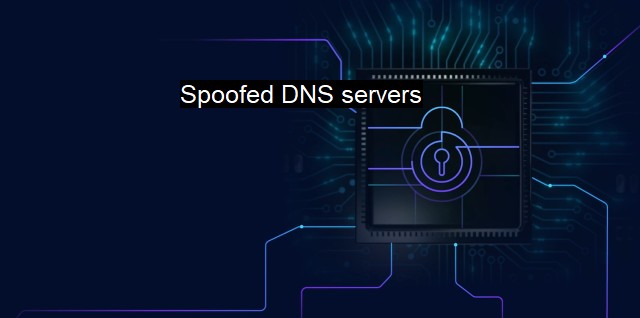What are Spoofed DNS servers?
Exploring Spoofed DNS Servers: Understanding the Risks and Implications for Cybersecurity
In the context of cybersecurity and antivirus approaches, "spoofed DNS servers" is a concept that frequently appears. Domain Name System (DNS) plays a crucial role in internet functionality, translating domain names such as 'www.google.com' into IP addresses like '192.8.32.45'. DNS acts as an internet phonebook, allowing seamless communication between devices and servers worldwide. cybersecurity threats such as fabricated, or "spoofed", DNS servers have the potential to undermine this mechanism's integrity.Spoofed DNS servers are a product of DNS spoofing, also known as DNS cache poisoning, an attack method that hackers employ to intrude into a DNS server and alter its information. The objective is to reroute a domain name to a different IP address - one usually controlled by the attacker. The user's device communicates with the attacker's server, mistakenly believing it correlates to the requested domain name. Consequently, this manipulation allows the attacker to control the user's navigation to malware-infested sites, phishing platforms, or data theft environments.
To understand how spoofed DNS servers function, it's essential to acknowledge the process of a DNS request. When a user types in a URL, the computer system sends a DNS lookup to its default DNS server. The server then delivers the respective IP address, connecting the user to the desired website. In a spoofing scenario, the attacker manipulates this query-response sequence. They infect the DNS server with malware that changes the originally stored, accurate IP addresses into fraudulent ones.
For instance, suppose an attacker spoofs the DNS record for a banking site. If the user aims to access their bank account, the manipulated DNS server redirects them to a visually identical, but hacker-controlled website. Here, if the user provides their login credentials, they unknowingly hand over this sensitive data to the attacker, leading to serious security compromises.
The deception involved in DNS spoofing poses significant risks for both individuals and organizations. The user may not identify any change; every operation seems routine until disaster strikes. Data confidentiality is compromised, leading to identity thefts, disclosures of sensitive personal or business information, and unauthorized transactions. For businesses, spoofed DNS servers could result in widespread phishing attacks across their networks, disrupting operations, imposing financial losses, damaging their reputation, and generating a huge setback in customer trust.
Given the dangers of spoofed DNS servers, cybersecurity needs to step up its measures to confront this threat. While antivirus software plays a pivotal role in protecting against such attacks, awareness is the first line of defense. Users need to be trained to identify suspicious website behavior—uneven performance, certificate warnings, and unexpected redirections, as possible spoofs.
Secure DNS protocols like DNSSEC can provide immunity against DNS poisoning by using explicit cryptographic signatures for authenticating DNS data and MT-Protected DNS to prevent Man-in-the-Move DNS Redirections (MITM) attacks. Network administrators should keep server software up-to-date, conduct regular network audits, and utilize DNS monitoring tools to detect and resolve irregularities promptly.
Spoofed DNS servers are a tangible threat in cybersecurity. Users and businesses need to equip themselves with robust antivirus software, employ secure DNS protocols, and continuously update their systems. Cybersecurity is not just about defense but also about ensuring trust in the digital world's fabric. Awareness and commitment on the part of the entire global internet community can significantly hinder attackers' success in their attempts to exploit DNS servers. Therefore, even though DNS spoofing and consequently spoofed DNS servers present parameters of vulnerability, they also represent a resounding call for strengthening cybersecurity measures.

Spoofed DNS servers FAQs
What is a spoofed DNS server?
A spoofed DNS server is a malicious server that is designed to respond to DNS requests with false information. It impersonates a legitimate DNS server to redirect traffic to a fraudulent website or steal sensitive information.How can a spoofed DNS server be detected?
A spoofed DNS server can be detected by monitoring network traffic for unusual DNS responses or by comparing the DNS responses with those from a known and trusted DNS server. Advanced anti-virus software can also detect and block traffic from known spoofed DNS servers.What are the risks of using a spoofed DNS server?
Using a spoofed DNS server can result in serious security risks such as data theft, malware infections, identity theft, and financial losses. The attacker can redirect your traffic to a fake website designed to steal your credentials, install malware on your system, or silently intercept your communication.How can I protect myself from spoofed DNS servers?
To protect yourself from spoofed DNS servers, you should use a reputable and trusted DNS service provider, enable DNSSEC (Domain Name System Security Extensions) when available, and use a reliable anti-virus software with DNS protection. You should also avoid clicking on suspicious links or downloading attachments from unknown sources.| | A | | | B | | | C | | | D | | | E | | | F | | | G | | | H | | | I | | | J | | | K | | | L | | | M | |
| | N | | | O | | | P | | | Q | | | R | | | S | | | T | | | U | | | V | | | W | | | X | | | Y | | | Z | |
| | 1 | | | 2 | | | 3 | | | 4 | | | 7 | | | 8 | | |||||||